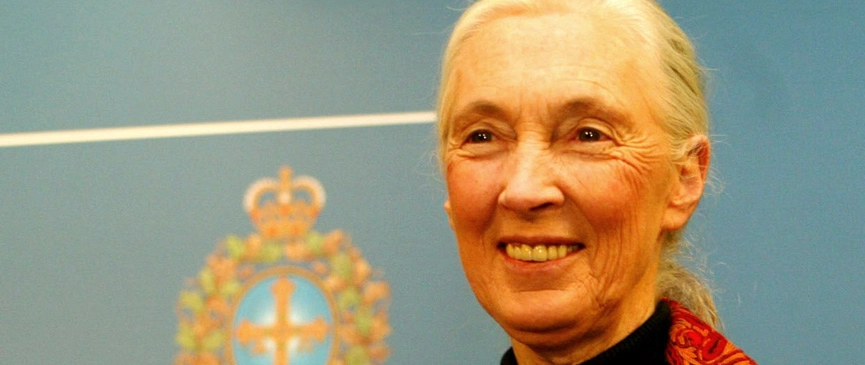Main content
Jane Goodall Prince of Asturias Award for Technical & Scientific Research 2003

Jane Goodall (London, Great Britain, 1934) was educated in Bournemouth and travelled to Kenya in 1957, where she soon met Leakey, the palaeontologist, who was instrumental in her taking up studies of the wild chimpanzees in the Gombe Stream Game Reserve (in Tanzania) in 1960. She finished her doctorate in Aetiology at the University of Cambridge in 1965. Such was her introduction to the academic world of the university, which has since bestowed countless honoris causa doctorates on her; these stand alongside such awards as the National Geographic Society’s Hubbard Medal (1995) and the title of Commander of the Order of the British Empire (CBE). She was appointed U.N. Ambassador for Peace in 2002.
A desire to educate in conservation and the protection of wild life, and to inform as wide an audience as possible of her findings, pervades all Goodall’s profoundly scientific work, and to this end she has set up the Roots and Shoots Foundation. Thanks to her tenacity, The Gombe Stream Game Reserve has been turned into a research centre under the protection of a National Park. It is the only place in the world where a group of chimpanzees, its individual members and the genealogy of the group have been studied for forty-five consecutive years. In 1977, Goodall set up the Jane Goodall Institute for Wildlife Research, Education and Conservation in the U.S.A. This is dedicated to the conservation of chimpanzees in Africa and throughout the world, and sponsors research projects in Burundi, Sierra Leone and Gambia. She has also established a Chain of Sanctuaries, where orphan chimpanzees confiscated from poachers and illegal traders are cared for and protected. Goodall has become personally involved in giving conferences and in holding Wildlife Knowledge Weeks. One of her major initiatives is the setting up of conservation clubs in schools – the Roots and Shoots Clubs – to stimulate young people’s respect and compassion for all forms of life. There are now over three thousand clubs in sixty-eight countries.
Outstanding amongst her books are In the Shadow of Man (1971), the Chimpanzees of Gombe (1986) and Through a Window (1990), where she explains her discoveries: how chimpanzees use simple tools; how they form collaborative hunting groups; how they demonstrate their complex, highly intelligent personalities and establish subtle, long-term relationships, forming surprisingly organised, complex societal structures.
(Notice: Photograp by David S. Holloway / Apix).
End of main content
